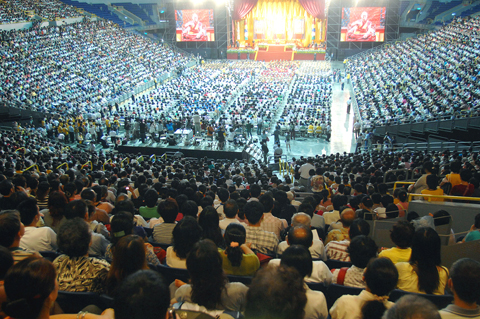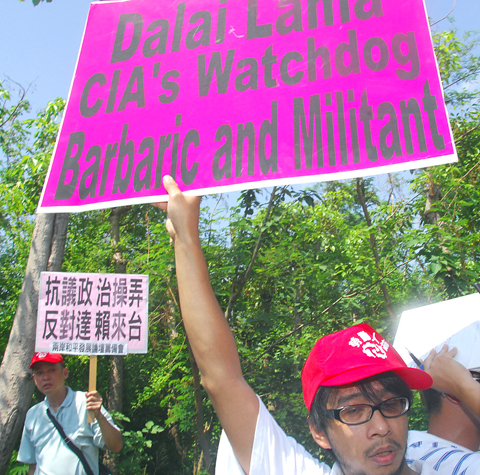More than 17,000 people from across the country packed the Kaohsiung Arena yesterday morning as the Dalai Lama held a two-hour prayer ceremony for the victims of Typhoon Morakot.
Although the ceremony officially started at 9:30am, many people began lining up on Monday night and by 9am the stadium was packed.
Admission to the event was on first-come-first-serve basis beginning at 7:30am.

PHOTO: PATRICK LIN, AFP
Aside from locals, hundreds of people arrived from Taipei via charter bus at about 6am.
Awaiting the spiritual leader’s arrival, members of the audience chanted om mani padme hum — the most commonly recited Buddhist mantra — in unison.
“I came here not to take pictures but to do something meaningful,” the Dalai Lama told the audience.

PHOTO: PATRICK LIN, AFP
“All Buddhists today — monks, men and women — must bear compassion at heart, pray and dedicate all the merits to the deceased and their families,” he said.
“Many people asked if we want to do good things and pray, why don’t we just do it in our own rooms? Well, when so many people are gathered here at the same time to pray, we could create a very powerful force that would generate special fruits,” he said.
The leader led the audience in reciting Buddhist chants and commented on the teachings of the Buddha.
He also urged the public to think positively and live their lives without losing confidence, even in difficult times.
“More than 500 people lost their lives in the disaster and the survivors are very worried,” he said.
“But in Linbian Township [林邊, Pingtung County], a lot of fish were able to escape [from fishponds] because of the flooding,” he said, followed by laughter from the audience.
Many people in attendance said they were impressed by the Dalai Lama’s wittiness in his teachings on a subject that can sometimes be dry, as well as his quick reaction to unexpected events.
“It was spectacular and the Dalai Lama was so witty, I loved how he reacted to the collapse of the table, which could have been an embarrassing moment,” a member of the audience surnamed Chao (趙) said after the ceremony was over.
At the beginning of the ceremony, the Dalai Lama asked that a small table in front of his seat be removed. However, as officials were in the process of removing it, it collapsed, to a complete silence in the audience.
The Dalai Lama broke the silence with loud laughter, which triggered more laughter and applauses from the crowd.
Chen Yu-ching (陳毓青), a follower of Tibetan Buddhism, said she was excited to see the Dalai Lama in person for the first time.
“I’m so happy, because I don’t know if I’ll have another chance to see the Dalai Lama again,” she said, adding that she took the day off from work and got up at 5am to drive down from Taichung for the event.
The 1989 Nobel Peace Prize-winner gave another lecture at an auditorium at his hotel in the afternoon.
Most of the problems that trouble our world are manmade, he said, and they can only be resolved when people consider all 6 billion human beings as brothers as sisters.
Many are “too much concerned about the ‘we’ and ‘they’ and are willing to sacrifice one’s life to destroy ‘the other,’” he said.
“That’s foolish, unwise,” he said.
“Think of humanity as part of ‘we,’” he said, adding that thought alone would not resolve all problems, but that problems can be resolved through compromise and dialogue.
Admission tickets for the afternoon lecture were distributed at the hotel starting at noon, with all 500 tickets gone in half an hour.
Unable to secure tickets for the lecture, more than 1,000 people stayed in the hotel lobby and courtyard, hoping to greet the Dalai Lama after the lecture. However, the Dalai Lama returned to his room directly after the lecture.
Not everyone welcomed the Dalai Lama.
Dozens of people from the China Unification Promotion Party (CUPP) and the True Awakening Joint Cultivation Buddhist Association (正覺佛教同修會) staged protests outside the Kaohsiung Arena in the morning and the hotel in the afternoon.
CUPP members shouted slogans accusing the Dalai Lama of engaging in “separatist” activities and claiming that Tibet and Taiwan are part of China.
Members from the True Awakening Buddhist Joint Cultivation Association, meanwhile, held up banners saying that the Dalai Lama refuses to accept the true teachings of the Buddha.
The group, established in 1997, represents a newly evolved Buddhist faction and is strongly critical of Tibetan Buddhism.
At a separate setting yesterday, Premier Liu Chao-shiuan (劉兆玄) said the visit by the Dalai Lama would influence cross-strait relations, but that the government hoped the impact would be minimal and of short duration.
“If the visit remains confined to humanitarian and religious subjects and is purely for the purpose of consoling the souls of the victims, it won’t be a big problem,” Liu told a press conference at the 8th Field Army in Kaohsiung Country’s Cishan Township (旗山), where Cabinet officials set up a makeshift office to oversee resettlement of victims and reconstruction in the wake of Morakot.
Liu said it was impossible to measure the extent of the influence the visit by the Dalai Lama would have on cross-strait relations because “it’s sort of abstract” and the visit is “just beginning.”
Asked whether the visit would hinder the government’s agenda for signing an economic cooperation framework agreement with China, Liu said the matter was “not a unilateral decision” but depended on “how the two sides interact with each other.”
Liu would not comment on the nature of the communication that had occurred between Taiwan and China on the visit by the Dalai Lama, saying that he “was not involved” but was “aware of the process.”
“We had some information and made some impact assessments … But to say more about this would do no good,” Liu said.
Meanwhile in Taipei, Chinese Nationalist Party (KMT) Legislator Lee Hung-chun (李鴻鈞) said the government should take this opportunity to review whether Taiwan is overly dependent on China.
KMT Legislator Lo Shu-lei (羅淑蕾) said the government needed to patch up the nation’s relations with Beijing as soon as possible because between 60 percent and 70 percent of Taiwan’s exports go to China.
ADDITIONAL REPORTING BY FLORA WANG

AGING: As of last month, people aged 65 or older accounted for 20.06 percent of the total population and the number of couples who got married fell by 18,685 from 2024 Taiwan has surpassed South Korea as the country least willing to have children, with an annual crude birthrate of 4.62 per 1,000 people, Ministry of the Interior data showed yesterday. The nation was previously ranked the second-lowest country in terms of total fertility rate, or the average number of children a woman has in her lifetime. However, South Korea’s fertility rate began to recover from 2023, with total fertility rate rising from 0.72 and estimated to reach 0.82 to 0.85 by last year, and the crude birthrate projected at 6.7 per 1,000 people. Japan’s crude birthrate was projected to fall below six,

US President Donald Trump in an interview with the New York Times published on Thursday said that “it’s up to” Chinese President Xi Jinping (習近平) what China does on Taiwan, but that he would be “very unhappy” with a change in the “status quo.” “He [Xi] considers it to be a part of China, and that’s up to him what he’s going to be doing, but I’ve expressed to him that I would be very unhappy if he did that, and I don’t think he’ll do that. I hope he doesn’t do that,” Trump said. Trump made the comments in the context

SELF-DEFENSE: Tokyo has accelerated its spending goal and its defense minister said the nation needs to discuss whether it should develop nuclear-powered submarines China is ramping up objections to what it sees as Japan’s desire to acquire nuclear weapons, despite Tokyo’s longstanding renunciation of such arms, deepening another fissure in the two neighbors’ increasingly tense ties. In what appears to be a concerted effort, China’s foreign and defense ministries issued statements on Thursday condemning alleged remilitarism efforts by Tokyo. The remarks came as two of the country’s top think tanks jointly issued a 29-page report framing actions by “right-wing forces” in Japan as posing a “serious threat” to world peace. While that report did not define “right-wing forces,” the Chinese Ministry of Foreign Affairs was

PREPAREDNESS: Given the difficulty of importing ammunition during wartime, the Ministry of National Defense said it would prioritize ‘coproduction’ partnerships A newly formed unit of the Marine Corps tasked with land-based security operations has recently replaced its aging, domestically produced rifles with more advanced, US-made M4A1 rifles, a source said yesterday. The unnamed source familiar with the matter said the First Security Battalion of the Marine Corps’ Air Defense and Base Guard Group has replaced its older T65K2 rifles, which have been in service since the late 1980s, with the newly received M4A1s. The source did not say exactly when the upgrade took place or how many M4A1s were issued to the battalion. The confirmation came after Chinese-language media reported